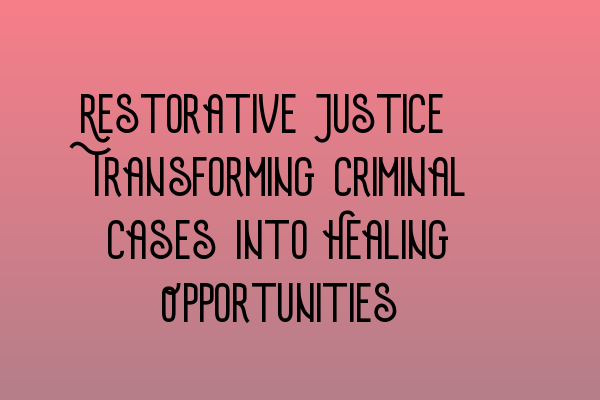Restorative Justice: Transforming Criminal Cases Into Healing Opportunities
At SQE Criminal Law & Practice Law UK, we believe in the power of restorative justice. In a system where punishment seems to be the primary focus, restorative justice offers a refreshing and transformative alternative. It allows for healing, accountability, and the opportunity for offenders to make amends.
Restorative justice is a process that brings together the victim, the offender, and any others affected by the crime to facilitate dialogue and resolution. It shifts the focus from punishment to repairing the harm caused by the criminal act. This approach recognizes that crime is not just a violation of laws, but also a violation of relationships and communities.
The Benefits of Restorative Justice
Restorative justice offers a range of benefits, both for the victim and the offender. For the victim, it provides the opportunity to express their feelings, have their questions answered, and be actively involved in the decision-making process. It allows them to regain a sense of control and closure, promoting healing and reducing the risk of re-victimization.
For the offender, restorative justice allows them to take responsibility for their actions and understand the impact they have had on others. It provides a chance for personal growth and the development of empathy and accountability. By actively participating in the process, offenders can work towards making amends and reintegrating into society.
How Restorative Justice Works
The restorative justice process typically involves a facilitated face-to-face encounter between the victim and the offender, known as a restorative justice conference. Trained facilitators ensure a safe and respectful environment, guiding the conversation towards understanding, empathy, and resolution.
During the conference, the victim has the opportunity to express their feelings, ask questions, and share the impact of the crime on their life. The offender is encouraged to listen actively, take responsibility for their actions, and offer a sincere apology. They may also propose ways to repair the harm caused, such as restitution or community service.
While the focus is on repairing the harm, restorative justice also acknowledges the need for appropriate consequences. The agreed-upon outcomes are recorded and may include actions such as counseling, educational programs, or supervision. These outcomes aim to address the underlying causes of the offense and prevent future harm.
Restorative Justice in Practice
Restorative justice is not a one-size-fits-all approach and may not be suitable for every case. It works best for crimes where the victim and offender have a pre-existing relationship or where the harm caused is more relational than purely transactional.
However, even in cases where a direct encounter is not possible, restorative justice principles can still be applied. Mediation, shuttle dialogues, or victim impact statements can be utilized to achieve a similar outcome.
At SQE Criminal Law & Practice Law UK, we understand the importance of restorative justice in transforming criminal cases into healing opportunities. We offer comprehensive SQE preparation courses and resources to equip future legal professionals with the knowledge and skills needed to navigate the complexities of restorative justice.
Conclusion
Restorative justice has the power to transform the criminal justice system by shifting the focus from punishment to healing and redemption. It offers victims a chance to heal, be heard, and actively participate in the resolution process. For offenders, it provides an opportunity for personal growth, taking responsibility, and making amends.
If you’re interested in learning more about the SQE exams and preparation, check out our related articles:
- SQE 1 Practice Exam Questions
- SQE 1 Practice Mocks FLK1 FLK2
- SQE 2 Preparation Courses
- SQE 1 Preparation Courses
- SRA SQE Exam Dates
Feel free to explore these articles to enhance your understanding of the SQE exams and how they relate to criminal law and restorative justice.
